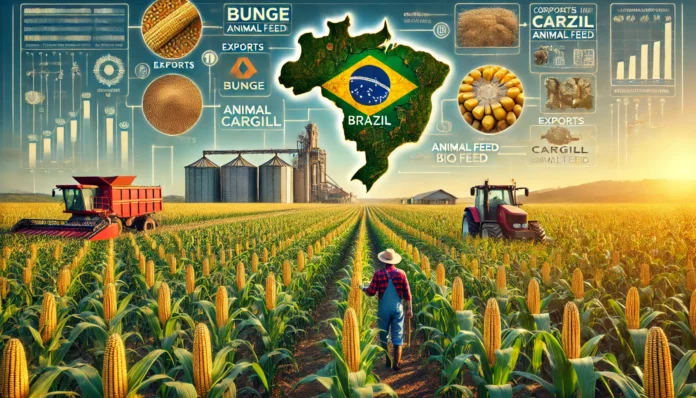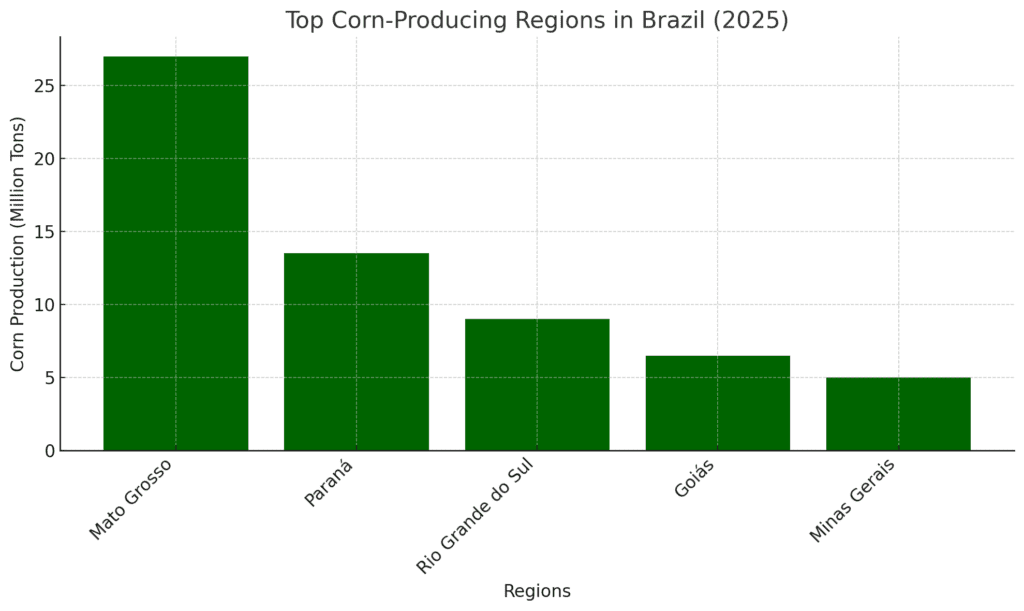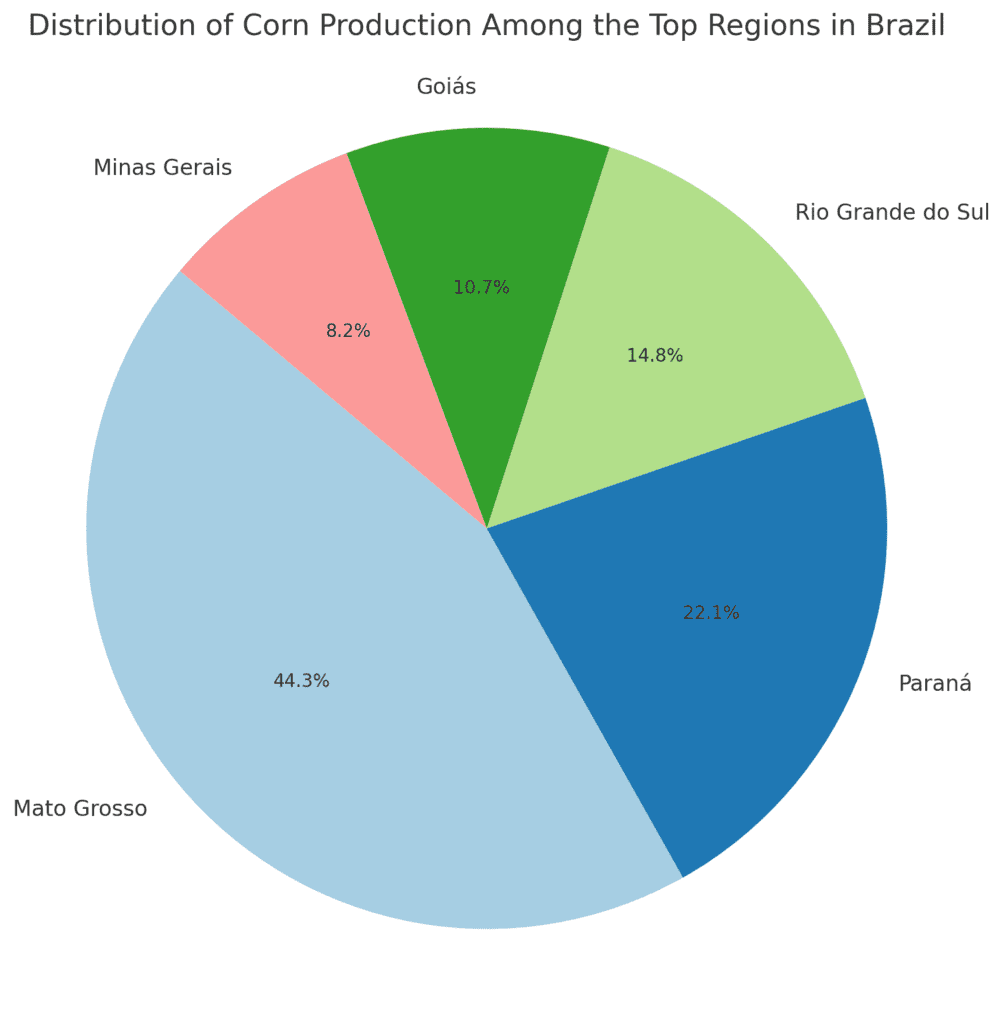
Introduction
Brazil is one of the world’s largest corn producers and exporters, playing a crucial role in global agricultural markets. As the second-largest exporter of corn, Brazil’s maize industry has become an essential player in the global supply chain, feeding both domestic and international markets. The country’s favorable climate, vast arable land, and cutting-edge agricultural technologies have allowed Brazil to scale its maize production over the years. Corn is essential to Brazil’s economy, contributing significantly to its agricultural GDP and driving growth in related industries such as animal feed, biofuels, and food products.
In this report, we explore Brazil’s corn industry in-depth, providing insights into its production regions, major companies, market dynamics, and the challenges and opportunities it faces in the global maize market.

The Role of Corn in Brazil’s Agriculture
Corn is a staple crop in Brazil, used in several key sectors including food, livestock feed, and industrial applications. The demand for corn in Brazil is driven by its extensive use in poultry and cattle feed, as well as in the production of ethanol, which is vital to Brazil’s renewable energy sector.
Key uses of corn in Brazil:
- Animal Feed: Brazil is one of the world’s largest producers of poultry and beef, making corn an essential component of animal feed. A large portion of Brazil’s corn production is consumed by the livestock industry, particularly for poultry, swine, and cattle farming.
- Biofuels: Corn is an important raw material for bioethanol production in Brazil, contributing to the country’s ambitious renewable energy goals. Brazil’s ethanol production, derived primarily from corn and sugarcane, has made it one of the largest producers of biofuels in the world.
- Food Products: Corn is used in various food products such as cornmeal, popcorn, and processed snacks. These products are not only consumed domestically but also exported to global markets.
- Industrial Products: Corn is used in the production of corn starch, corn syrup, and other industrial products, supporting the country’s food processing and manufacturing sectors.
Key Corn-Producing Regions in Brazil
Brazil’s corn production is concentrated in several key regions, each benefiting from favorable climatic conditions and modern farming practices. The following states are the primary contributors to Brazil’s overall corn output:
1. Mato Grosso
Mato Grosso is Brazil’s largest corn-producing state, accounting for a significant portion of the country’s total maize output. The state benefits from vast arable land, modern farming techniques, and access to critical infrastructure for transportation and export. Mato Grosso produces both the summer and second-crop (safrinha) maize, with the latter playing a significant role in boosting the country’s overall corn production.
Key Facts:
- Largest corn producer in Brazil
- Significant contributor to both summer and second-crop maize
- Supports major agribusiness players and infrastructure
2. Paraná
Paraná is another top corn-producing state in Brazil. It is well-known for its high-quality maize production, and it benefits from favorable rainfall and soil conditions that allow for high yields. Paraná’s maize is used extensively for animal feed and food products, contributing significantly to both the domestic and export markets.
Key Facts:
- One of the top maize-producing states
- Focus on both food-grade corn and animal feed
- Strong emphasis on sustainability and modern farming practices
3. Rio Grande do Sul
Rio Grande do Sul is a key player in Brazil’s corn industry, primarily known for its second-crop maize. The state has a highly productive agricultural sector, with a focus on both corn and soybeans. The proximity to Argentina and Uruguay also provides Rio Grande do Sul with easy access to international markets, particularly in the Southern Cone region.
Key Facts:
- Focus on second-crop (safrinha) maize production
- High yields and sustainable farming practices
- Strategic location for exports to neighboring countries
4. Goiás
Goiás is a central state in Brazil’s corn production and plays a key role in the country’s agribusiness sector. The state benefits from efficient farming systems, including advanced irrigation techniques, and produces both corn and soybeans. Goiás also plays a role in meeting the increasing demand for corn in the biofuel and livestock sectors.
Key Facts:
- Major contributor to second-crop maize production
- Focus on efficiency and yield optimization
- Key supplier to the animal feed and biofuels industries
Major Companies in Brazil’s Corn Industry
Brazil’s maize industry is supported by several large agribusinesses that play critical roles in production, processing, and export. These companies contribute significantly to the country’s position as a global leader in corn production.
1. Bunge Brasil
Bunge Brasil is one of the largest agribusiness companies in Brazil and a key player in the country’s corn industry. The company sources corn from Brazilian farmers and processes it for various uses, including animal feed, food products, and biofuels. Bunge has a strong presence in Brazil, with a network of grain elevators, processing plants, and export terminals that facilitate the efficient movement of corn both domestically and internationally.
Key Facts:
- Major player in grain trading, processing, and exports
- Focus on both animal feed and biofuel production
- Strong logistics infrastructure supporting global exports
2. Cargill Brasil
Cargill is a global leader in agribusiness with significant operations in Brazil. The company is involved in the trading, processing, and exporting of corn, serving both the domestic market and global customers. Cargill works closely with Brazilian farmers to source high-quality corn for its various food and feed applications.
Key Facts:
- Leading supplier of corn for food and feed production
- Strong focus on biofuels and animal feed
- Extensive infrastructure for trading and processing
3. Amaggi
Amaggi is one of Brazil’s largest agricultural companies, primarily focused on the production of soybeans, corn, and cotton. The company operates large-scale farming operations in several key states, including Mato Grosso. Amaggi is involved in the entire value chain, from farming to processing and exporting corn, making it a key player in Brazil’s maize sector.
Key Facts:
- Major producer of corn and soybeans
- Focus on sustainable farming practices and large-scale production
- Key exporter of Brazilian maize
4. SLC Agrícola
SLC Agrícola is one of Brazil’s largest agribusiness companies, with a significant focus on corn production. The company operates extensive farms across Brazil, particularly in Mato Grosso. SLC Agrícola uses advanced farming techniques and precision agriculture to optimize corn yields and ensure sustainability in its operations.
Key Facts:
- Large-scale corn producer in Mato Grosso
- Focus on precision agriculture and sustainability
- Strong commitment to improving productivity

Challenges Facing Brazil’s Corn Industry
Despite its success, Brazil’s corn industry faces several challenges that could affect future growth and profitability.
1. Climate Change
Brazil’s maize production is highly dependent on weather patterns, with droughts and irregular rainfall posing risks to yields. Climate change is expected to exacerbate these issues, affecting the stability of maize production. Regions like Mato Grosso and Goiás, which rely heavily on second-crop maize (safrinha), may face difficulties if the rainy season becomes shorter or more erratic.
2. Logistical Bottlenecks
Despite strong infrastructure, Brazil still faces logistical challenges in transporting corn from farms to export terminals. Delays and inefficiencies in the supply chain can increase costs and disrupt the timely export of maize. Continued investments in infrastructure are crucial to ensuring the competitiveness of Brazil’s maize industry on the global stage.
3. Price Volatility
Like other agricultural commodities, corn prices are subject to volatility. Price fluctuations can make it difficult for producers to plan effectively, particularly for small farmers who may lack access to financial hedging instruments.
Opportunities in the Brazilian Corn Industry
Despite these challenges, there are several opportunities for growth in Brazil’s corn industry.
1. Increased Demand for Animal Feed
With the growing demand for poultry and beef, Brazil’s livestock sector is expected to continue to expand. This will increase demand for corn as a primary ingredient in animal feed, providing a stable market for maize producers.
2. Growth in Biofuels
Brazil’s commitment to renewable energy, particularly ethanol production from corn, presents significant growth opportunities for the corn sector. As demand for biofuels rises globally, Brazil is well-positioned to meet the needs of international markets, particularly in North America and Europe.
3. Adoption of Sustainable Practices
The Brazilian government and agribusinesses are increasingly focused on sustainable farming practices. These efforts could improve productivity while reducing environmental impact, making Brazil’s corn industry more resilient in the face of climate change.
Conclusion
Brazil’s corn industry plays a central role in the country’s agricultural economy and its position as a top global exporter of maize. With vast agricultural land, modern farming techniques, and strong market demand, Brazil is well-positioned to maintain its leadership in the global corn market. However, the industry must address challenges such as climate change, logistical inefficiencies, and price volatility. By embracing sustainability, improving infrastructure, and continuing to innovate, Brazil’s corn industry can continue to thrive and meet the growing global demand for maize.


